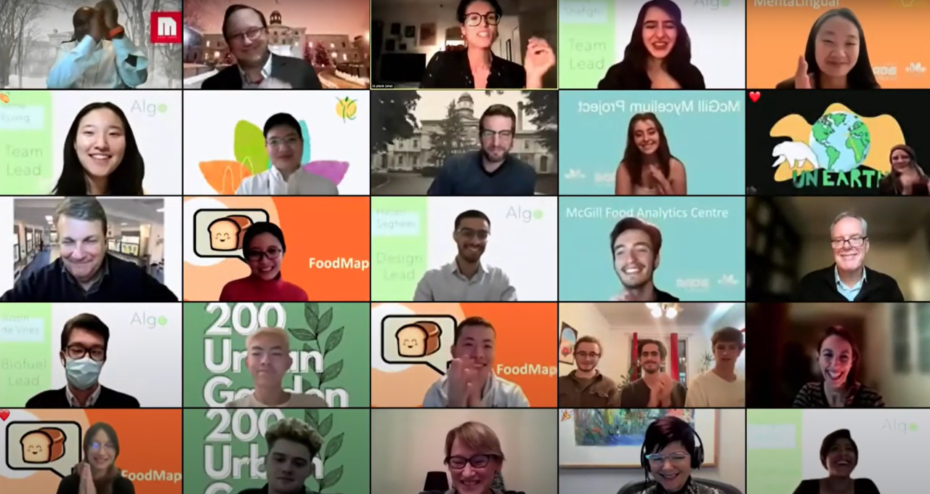
As McGill looks to its third century, the impact200 challenge presented the ideal opportunity to celebrate McGillians and their bright ideas – ones that will shape the future of our campuses and our world. All the while, students and young alumni alike were provided with a hands-on learning opportunity. On December 2, the Bicentennial Office hosted the impact200 Awards Ceremony – the culmination of a year and a half of identifying and supporting Bright Spots in the McGill community.
Also known as the Bicentennial Student Sustainability Challenge, impact200 began in the summer of 2020 with the goal of uniting like-minded individuals in the McGill community who are passionate about addressing sustainability issues. Teams of students, initially 44 submissions, worked together under the mentorship of McGill alumni and employees to develop transformative projects. Each project looks to implement solutions to local or global sustainability challenges, inspired by one or more of the United Nations’ 17 Sustainable Development Goals.
Award-winning journalist, author and alumni Liz Plank hosted the December 2 ceremony, welcoming the finalist teams, mentors and a number of guests. Elena Bennett, Professor and CRC Chair in Sustainability Science at McGill University, delivered her keynote address, “Bright Spots: Seeds of Good Anthropocenes.” Additionally, Francois Miller, Executive Director of McGill’s Office of Sustainability spoke on the role of Sustainability Projects Fund in supporting sustainability at McGill.
The Public’s Vote winner was the first award that was handed out. Over the last month both the McGill community and the general public were invited to vote for their favourite project. Algo, the team working to remove algal blooms by collecting the excess algae and converting it into biomass, was crowned the winner.
Manuel Balán, Associate Dean of the Faculty of Arts, announced a tie for third place: CoolHealth and unEarth. CoolHealth is developing a mobile solar refrigerator, implemented in Burkina Faso, to provide better access to sustainable cooling in mobile clinics globally. The unEarth educational platform will teach youth about links between processes within environmental systems, with resources available in English, French and Spanish.
Bruce Lennox, Dean of the Faculty of Science, announced MentaLingual as the second-place winner. The MentaLingual platform helps users gain actionable insights into self-awareness, empathy, self-regulation, social skills, and motivation using the latest research in behavioural science.
Suzanne Fortier, Principal and Vice-Chancellor of McGill University, announced the winner of impact200, MiniWaste. Food Map, by Team MiniWaste, looks to create an information-sharing platform to connect small food banks, food donors and people in need, with real-time geographical information on the availability, perishability, type, and quantity of donated food in the city.
Each finalist team is invited to a one-on-one meeting with experts from the Dobson Centre, courtesy of Marie Josée Lamothe, Academic Director of the McGill Dobson Centre for Entrepreneurship. This collaboration will identify next steps for their projects, to ensure that these ideas continue to be supported after the challenge. In addition, Dr. Chantal Line Carpentier – Chief, United Nations Conference on Trade and Development (UNCTAD) – invited prize-winning teams to visit the United Nations in May 2022.
Missed the conference? You can watch the recording.
